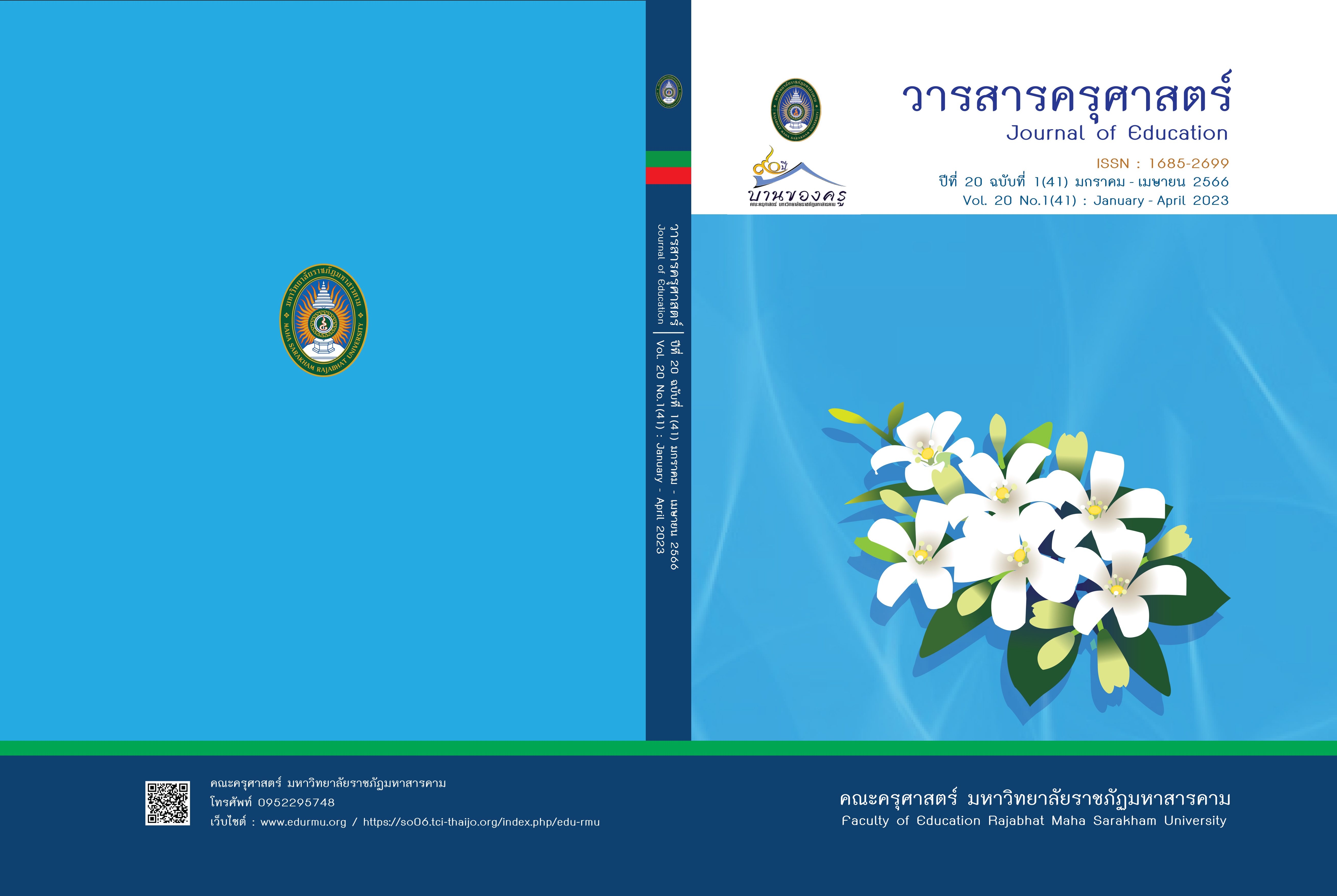An Ethical Leadership Development Program of School Administrators under Mahasarakham Primary Educational Service Area Office 2
Main Article Content
Abstract
The objectives of this research were 1) to study the current state and the reliance on ethical leadership for school director and 2) to study the guidelines for developing ethical leadership for school director. The research was divided into 2 phases. The first phase studied the current state and the objective state of ethical leadership for school director. The sample group was educational personnel 320 people research tools as a questionnaire with a consistency index of 0.80 - 1.00, with a confidence of 0.95, and a power of classification between 0.25 - 0.58. The tool used was an interview with 7 qualified persons. Data were analyzed by content analysis.
The results of the research were as follows: 1) The level of ethical leadership for school director overall and in each aspect at the highest level in the following order corporate ethical and teamwork ethical and self ethical 2) Guidelines for the development of ethical leadership for school director, i.e. the program to develop ethical leadership for school director, consisting of 1) principles 2) objectives and 3) content There are 3 modules: Module 1) self ethical, Module 2) teamwork ethical, Module 3) corporate ethical. The overall program evaluation results were appropriate at the highest level and the probability was at the highest level.
Article Details

This work is licensed under a Creative Commons Attribution-NonCommercial-NoDerivatives 4.0 International License.
ข้อกำหนดเบื้องต้นที่ผู้นิพนธ์(ผู้ส่งบทความ) ควรทราบ
1. ผู้นิพนธ์ที่ประสงค์จะลงตีพิมพ์บทความกับวารสาร ตั้งแต่เดือนมกราคม 2563 เป็นต้นไป ให้ใช้รูปแบบใหม่ (Template 2563) โดยสามารถดูตัวอย่างได้ที่เมนู GUIDELINES
2. จะตีพิมพ์และเผยแพร่ได้ ต้องผ่านการประเมินจากผู้ทรงคุณวุฒิ (Peer Review)
3. การประเมินบทความโดยผู้ทรงคุณวุฒิ (Peer Review) เป็นแบบ Double Blind
4. การอ้างอิงบทความใช้หลักเกณฑ์ APA (American Psychological Association) คลิก
5. บทความถูกปฏิเสธการตีพิมพ์ ไม่ผ่านการประเมิน ผู้นิพนธ์ขอยกเลิกเองหรือชำระเงินก่อนได้รับการอนุมัติ ทางวารสารไม่มีนโยบายการคืนเงิน
References
กมลทิพย์ ทองกำแหง. (2554). กลยุทธ์การพัฒนาภาวะผู้นำเชิงจริยธรรมสำหรับผู้บริหารโรงเรียนเอกชน
[วิทยานิพนธ์ปริญญาครุศาสตรดุษฎีบัณฑิต ไม่ได้ตีพิมพ์]. จุฬาลงกรณ์มหาวิทยาลัย.
ขนิษฐ์ณิชา ทองสุข. (2560). การพัฒนาโปรแกรมเสริมสร้างภาวะผู้นำเชิงจริยธรรมของผู้บริหารโรงเรียนสังกัด
สำนักงานคณะกรรมการการศึกษาขั้นพื้นฐาน [วิทยานิพนธ์ปริญญามหาบัณฑิต ไม่ได้ตีพิมพ์]. มหาวิทยาลัย
มหาสารคาม
เชษฐา ค้าคล่อง. (2557). การพัฒนาโปรแกรมเสริมสร้างภาวะผู้นำแบบมุ่งบริการของผู้บริหาร สถานศึกษาขั้นพื้นฐาน
[วิทยานิพนธ์ปริญญาการศึกษาดุษฎีบัณฑิต ไม่ได้ตีพิมพ์]. มหาวิทยาลัยมหาสาคาม.
บุญชม ศรีสะอาด. (2560). การวิจัยเบื้องต้น (พิมพ์ครั้งที่ 10). สุวีริยาสาส์น จำกัด.
ไพศาล วรคำ. (2562). การวิจัยทางการศึกษา (พิมพ์ครั้งที่ 10). ตักสิลาการพิมพ์.
รัตติกรณ์ จงวิศาล. (2556). ภาวะผู้นำ LEADERSHIP ทฤษฎีการวิจัย และแนวทางสู่การพัฒนา. Theories, Research,
and Approaches to Development. จุฬาลงกรณ์มหาวิทยาลัย.
ระเบียบ สมจิตร. (2542). คุณธรรมจริยธรรมของผู้บริหารตามความคิดเห็นของบุคลากรใน หน่วยงานส่วนกลางของ
กรมการศึกษานอกโรงเรียน กระทรวงศึกษาธิการ [วิทยานิพนธ์ปริญญานิพนธ์มหาบัณฑิต ไม่ตีพิมพ์].
มหาวิทยาลัยศรีนครินทรวิโรฒ.
วีณา วงศ์วิสิทธิ์. (2542). พุทธศาสน์. มหาวิทยาลัยราชภัฏนครปฐม.
สุวิทย์ ยอดสละ. (2556). การพัฒนาภาวะผู้นำเชิงวิสัยทัศน์ของผู้บริหารโรงเรียนประถมศึกษาสังกัดสำนักงาน
คณะกรรมการการศึกษาขั้นพื้นฐาน [วิทยานิพนธ์ปริญญาการศึกษาดุษฎีบัณฑิต ไม่ได้ตีพิมพ์].
มหาวิทยาลัยมหาสารคาม.
สิวลี ศิริไล. (2550). ความรู้เบื้องต้นเกี่ยวกับความคิดการใช้เหตุผลและจริยธรรม. เอกสารประกอบคำบรรยาย
ณ มหาวิทยาลัยสวนสุนันทา. มหาวิทยาลัยสวนสุนันทา.
สำนักงานคณะกรรมการข้าราชการครูและบุคลากรทางการศึกษา. (2552). หลักเกณฑ์และวิธีการพัฒนาข้าราชการ
ครูและบุคลากรทางการศึกษาก่อนแต่งตั้งให้ดำรงตำแหน่งผู้อำนวยการสถานศึกษา. วารสารข้าราชการครู
และบุคลากรทางการศึกษา, 30, 30-32.
Jobs, D.B. (2010). 8 เคล็ดลับบริหารองค์กรเพิ่อความเป็นหนึ่ง. Retrieved from
http://th.jobsdb.com/TH/EN/Resources/JobSeekerArticle/general52.htm?ID=694.
Josephson, M. (2009). Ethical leadership outcomes Student Leader Learning Outcomes (SLLO) project. Retrieved
from htt://josephsoninstitute,org/MED/MED-2sixpillars.html.
Karakose, T. (2007). High school teachers perceptions regarding principals’ ethical leadership Turkey. Asia Pacific
Education Review, 8(3), 464-437.
Krejcie, R. V. & Morgan, D. W. (1970). Determining Sample Size for Research Activities. Educational and
Psychological Measurement, 30(3), 607-610.
Macaluso, T. (2014). A Model for Ethical Leadership. Retrieved from
http://www.newthinker.com/NewThinking%20about%20ETHICAL%20LEADERSHIP.pdf.
Magnuson, W. C. (1971). The characteristics of successful school business managers. Dissertation Abstract International,
(12), 133-A.
Northouse, P. G. (2010). Leadership: Theory and Practice (5th ed). Thousand Oaks.
Pietersen, P. (2010). Strategies learning: how to smarter than your competition and turn key insights in to
competitive advantage. John Wiley & Sons.


